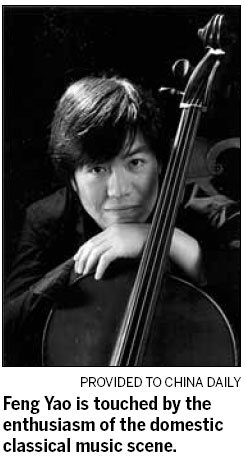Young cellist wows audiences at homeland concerts
Updated: 2013-12-29 08:22
By Chen Nan(China Daily)
|
|||||||
Feng Yao was a little bit anxious before he stepped onto the stage of the Art Library at the National Center for Performing Arts on Dec 15. Indeed, for a young cellist who has spent most of his life living and performing in Germany, to give a solo show in his homeland was a challenge.
He opened his show with a piece rarely performed in China - Beethoven's seven variations on theme from Mozart's The Magic Flute. The theme comes from the duet Bei Mannern, welche Liebe fuhlen (In Men Who Know the Feeling of Love).
"The piece is sung by sopranos as praise of the love between husband and wife, and I made some changes to adapt it to cello," he said before he played the music. "It is Beethoven's long desire to find a soul mate and he scored the variations for cello and piano, which sounds like the dialogue between husband and wife."
During the two-hour performance, Feng played his instrument while explaining the music pieces, including Tchaikovsky's Andante Cantabile, Rachmaninoff's Cello Sonata in G Minor Op19 III Andante and Astor Piazzolla's Le Grand Tango. He also played Saint-Saens' The Swan and dedicated it to his mother, who came to his show at the NCPA that day.

After Feng finished his last note and lifted his bow, he saw a full-house audience clapping. Some people were standing.
Later, he was told that not only had some professionals come to his show but also luminaries who do not work in his field, such as rock musicians and filmmakers, as well as ordinary people who have an interest in cello and classical music.
"I didn't expect that audiences in China would grow so fast. Their warm feedback made me excited onstage," says Feng, 32.
Studying at The Univers ity of Music Detmold, one of Germany's leading music schools, from 18, Feng has been the principal cellist of the Schleswig-Holstein Symphony Orchestra since 2008.
He decided to return to China after performing with several symphony orchestras at the NCPA a few years ago. The booming classical music scene in the country prompts the cellist to return frequently.
The show at the NCPA two weeks ago was his first attempt at blending his elaboration and playing. His second stop will be on Jan 4 at Ullens Center for Contemporary Art.
"I like adapting music pieces, which are not for cello, into cello versions," says Feng, who first played a cello adaptation from French composer Maurice Ravel's Tzigane at Beijing Concert Hall in 1996, when he was 17.
"I want to share with the audience what I have learned and how I understand those classical music pieces," he adds.
Feng's music journey started accidentally. He had dreamed of becoming a painter since childhood but was chosen to study cello at 5 years old by Liu Zhengtan from Feng's hometown, Changchun, the capital city of Jilin province. Liu persuaded Feng's parents because he believed in the kid's talent.
Four years later, Liu took the 9-year-old Feng to Beijing to apply to the primary school affiliated to the Central Conservatory of Music. Feng then began learning with renowned cellists, including Zhou You and Chen Yuan.
"Liu influenced me a lot and because of his training, I always want to challenge myself and find out my potential," Feng recalls.
That's why he gave up enrollment in the Central Conservatory of Music and went to Germany in 2001, where he studied with Wolfgang Emanuel Schmidt, one of the world's leading cellists.

The early days were not easy for Feng, since the lessons and approach were different in Germany than in China.
"Schmidt gave me some simple pieces to practice again and again. I didn't understand and asked him. Later I knew that he didn't want to polish my skills but to make me feel the emotion and to find my own style," Feng says.
One of the happiest things for Feng was playing at various music festivals, where he could meet young musicians from all over the world. He realized that what makes a musician successful is to display his personal charisma onstage to identify his style.
"As a cellist from China, I have a different personality and cultural background from Western musicians. Those are my advantages and I am trying to merge those treasures into my playing," he says.
chennan@chinadaily.com.cn
(China Daily 12/29/2013 page9)